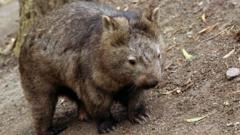A US influencer, Sam Jones, finds herself at the center of a heated conservation debate after a video of her taking a wild baby wombat away from its mother sparks outrage from animal rights activists and Australian officials.
US Influencer Faces Backlash for Disturbing Baby Wombat Incident

US Influencer Faces Backlash for Disturbing Baby Wombat Incident
Social media celebrity criticized for endangering wildlife in Australia
Australia is reeling from a recent incident involving a US influencer, Sam Jones, who was filmed taking a baby wombat away from its distressed mother in a disturbing social media stunt. The footage, which went viral before its deletion, shows Jones, who refers to herself as an "outdoor enthusiast and hunter," picking up the wombat joey near a roadside while the mother audibly chases after them in distress. Australian Prime Minister Anthony Albanese criticized the act, suggesting that Jones should “take a baby crocodile from its mother and see how you go there,” highlighting the recklessness involved.
The backlash from conservationists has been swift and severe. Immigration officials are now reviewing Jones's visa, with calls for her deportation gaining traction. An online petition demanding her removal has gathered over 10,500 signatures, alarming Home Affairs Minister Tony Burke, who expressed skepticism about Jones being able to secure a visa in the future.
Critics like the Wombat Protection Society described the act as shocking and indicative of a troubling attitude towards wildlife, asserting that the joey was compromised during the ordeal, especially since it was returned to a potentially dangerous roadside location. Jones attempted to defend her actions in the comments, stating she held the wombat for only a minute and claimed it was unharmed. However, experts underline that any separation from the mother can be distressing and harmful to baby wombats, which are legally protected in Australia.
Suzanne Milthorpe, Head of Campaigns at World Animal Protection Australia, emphasized that interactions with native wildlife should adhere to legal protections against harming or taking them from their natural environment, further solidifying the notion that wildlife are not mere props for entertainment. Australia's Foreign Minister Penny Wong weighed in, labeling the video as “dreadful,” urging the public to respect wildlife and their habitats.
This controversial incident raises crucial questions about wildlife ethics, social media influence, and the responsibilities that come with public recognition. The ramifications of Jones's actions serve as a stark reminder of the impact that individual actions can have on vulnerable wildlife.




















